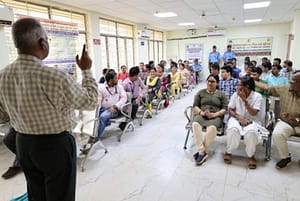Digital Bharat Nidhi (DBN) under Department of Telecommunications (DoT), signed a MoU with National Bank for Agriculture and Rural Development (NABARD) for Digital Rural Empowerment for rural areas of the across the country. The objective of the MoU is to drive rural development in institutions supported by NABARD, by providing access to digital services, digital governance, and promoting a digital economy through high-speed broadband connectivity under BharatNet program.
The key areas of this collaboration include:
Reference Data Sharing: NABARD will share information including geo-coordinates and contact details of institutions and DBN will share geo-coordinates of BharatNet Point of Presence (PoP) locations in Gram panchayats (GPs) from where high-speed broadband connectivity to be extended to rural institutions/enterprises.
Digital Content Sharing: Both parties will share digital content (audio/video/text) related to their schemes and projects with each other.
Digital Services Integration: Both parties will share information on their digital services/citizen-centric applications/portals/e-governance platforms for further integration and dissemination of information.
Awareness and Capacity Building: Both parties will collaborate on awareness programs and capacity-building measures for start-ups, entrepreneurs, and rural institutions.
High-speed Broadband Access to Enable Digital Economy: Both parties will promote each other’s efforts to enable a digital economy by leveraging high-speed broadband connectivity using BharatNet.
Inclusion of ICT Infrastructure: NABARD will promote the inclusion of ICT infrastructure, including broadband access support to institutions under their schemes and projects.
The MoU was signed in the presence of Dr. Neeraj Mittal, Secretary (Telecom), Sh. Niraj Verma, Administrator, DBN, Sh. Sanjiwan Sinha, Project Director (PMU), DBN, Sh. Robert Ravi, CMD, BSNL, Sh. Shaji K.V, CMD, NABARD and Sh. Sanjay Kumar Gupta, CGM, NABARD.
DBN has been instrumental in enabling high-speed broadband and mobile connections across Gram Panchayats (GPs) and villages in the country. This collaboration, through high-speed broadband connectivity under BharatNet will further provide digital impetus to the institutions such as Primary Agriculture Co-operative Credit Societies, etc. supported and computerized by NABARD.





















